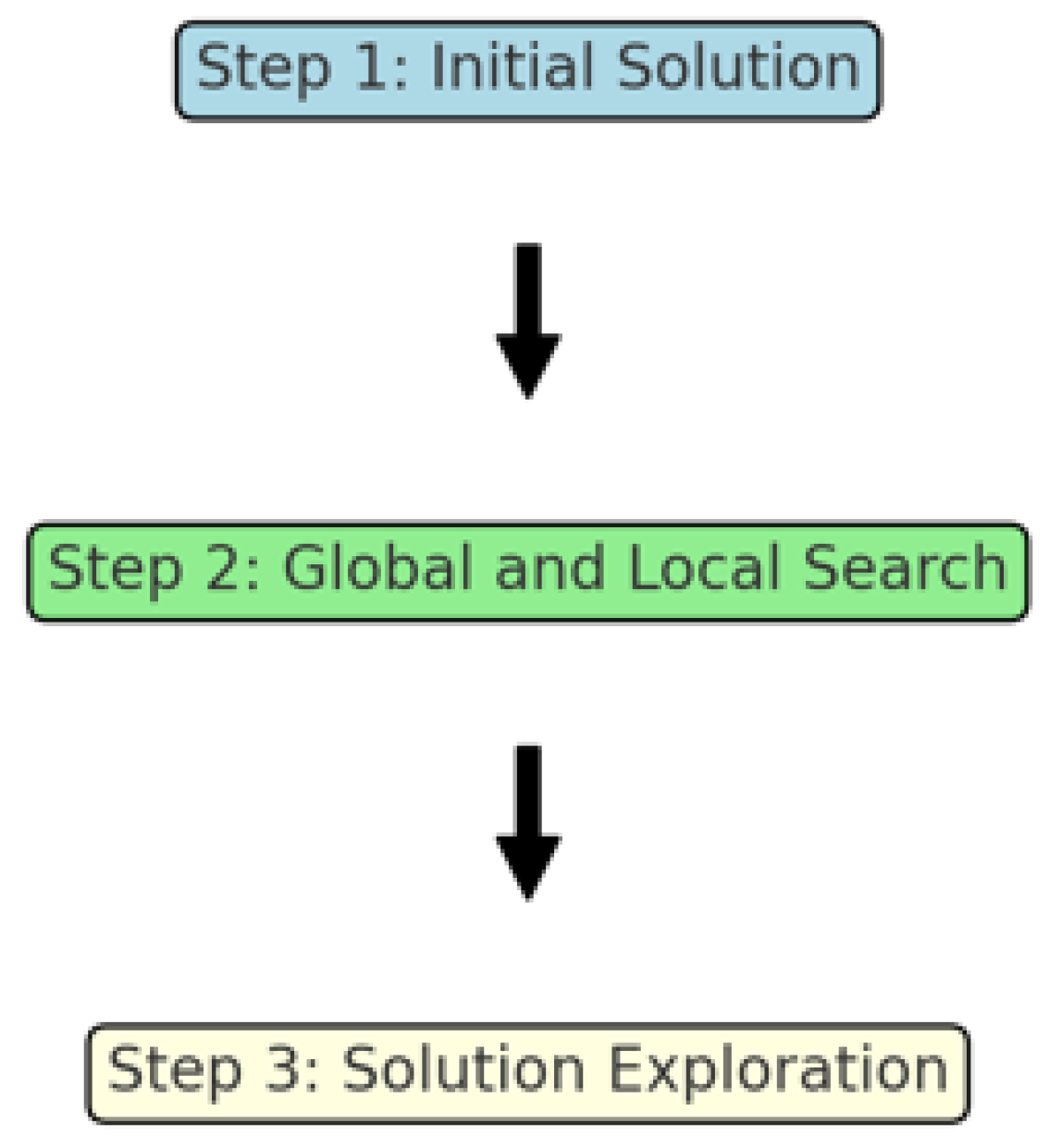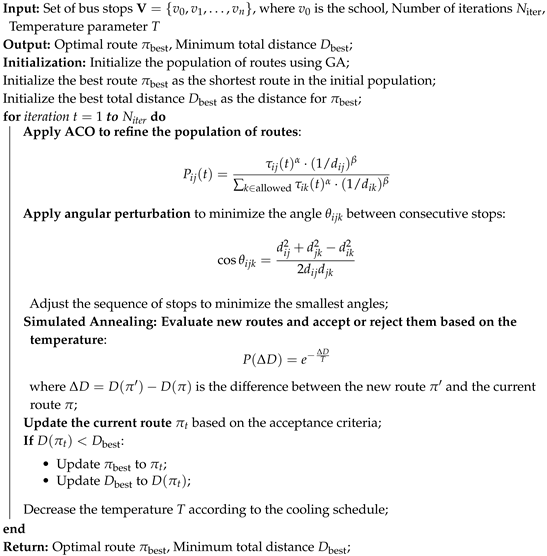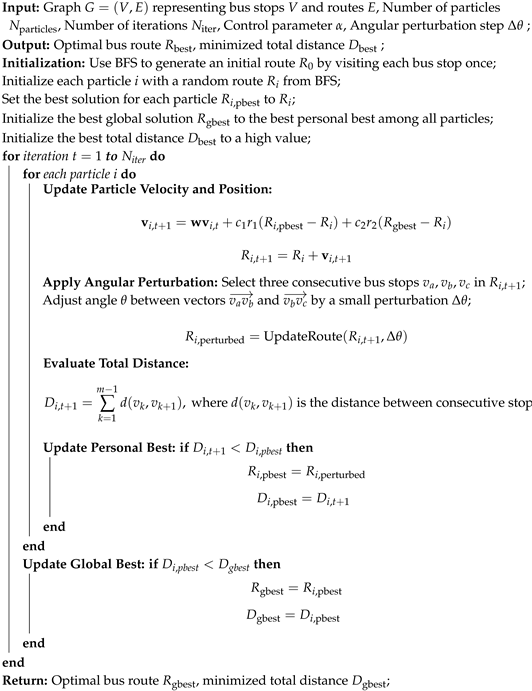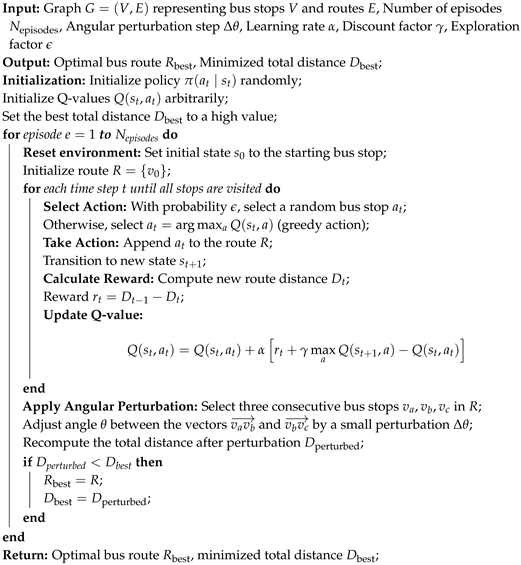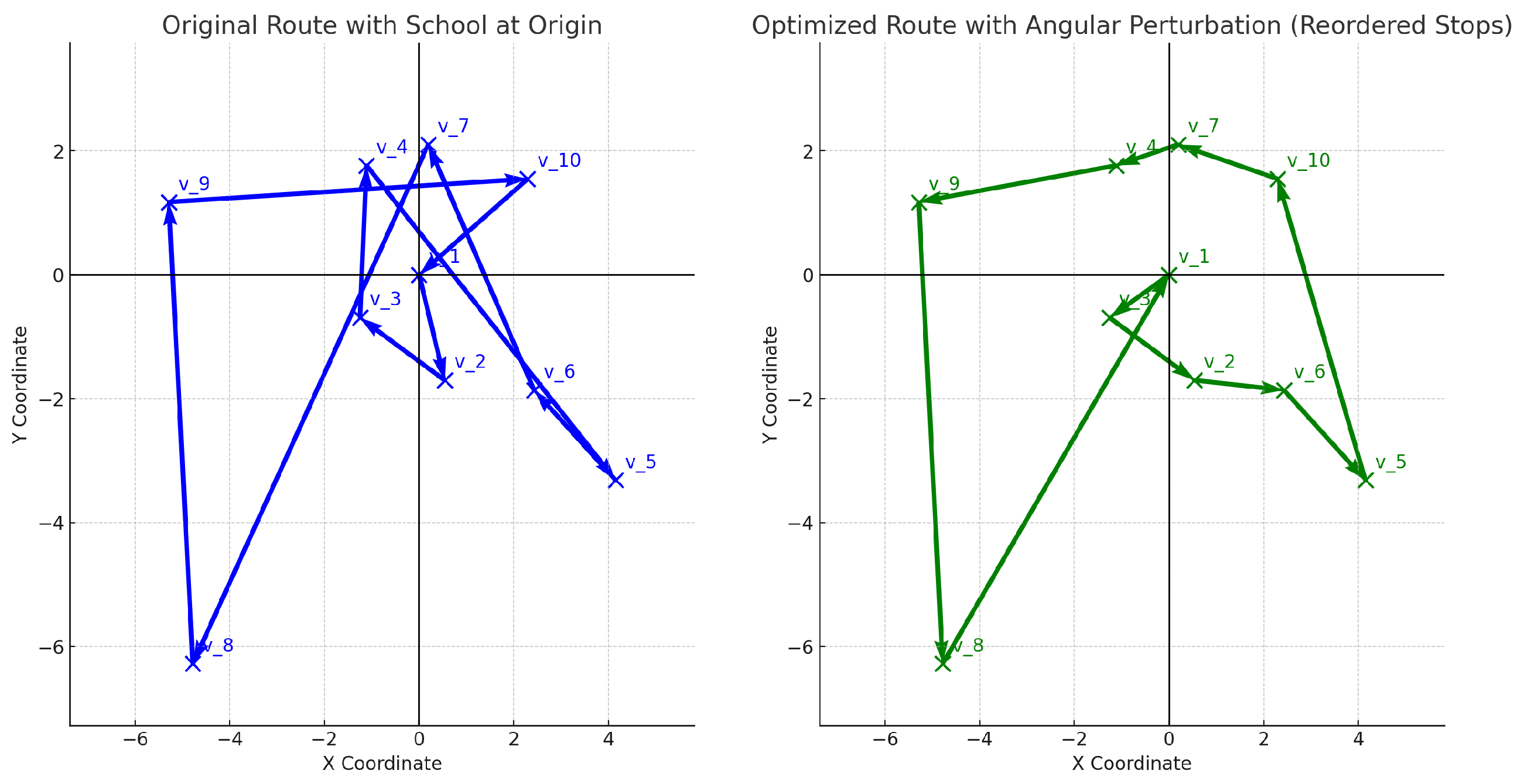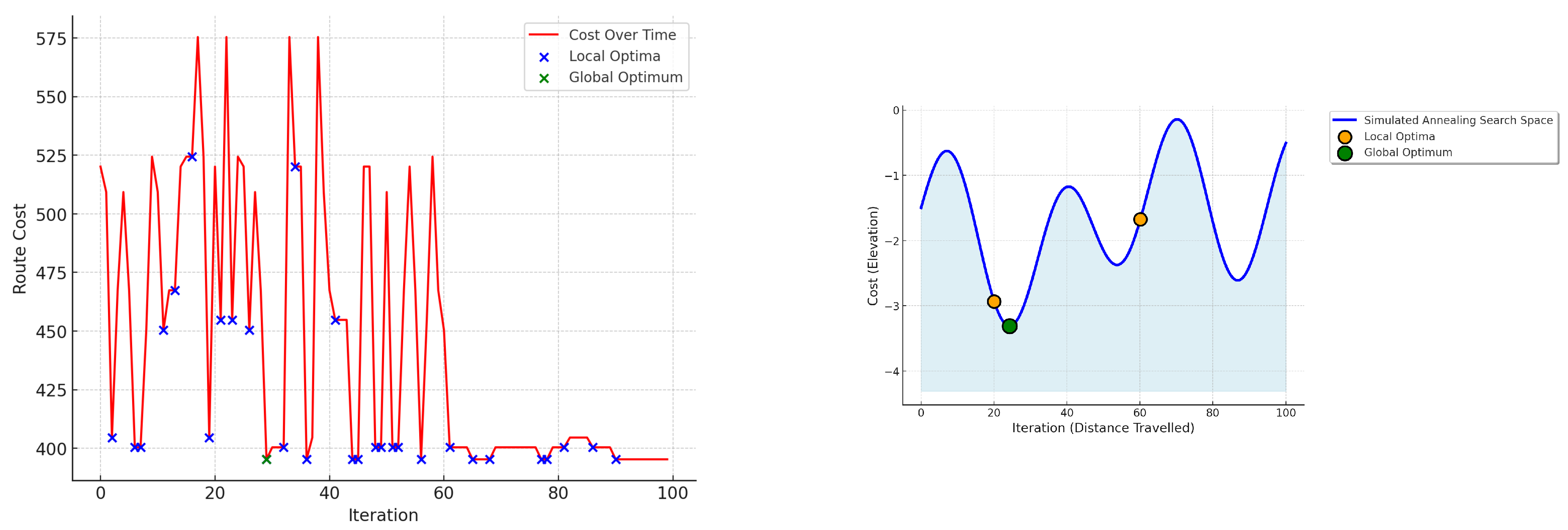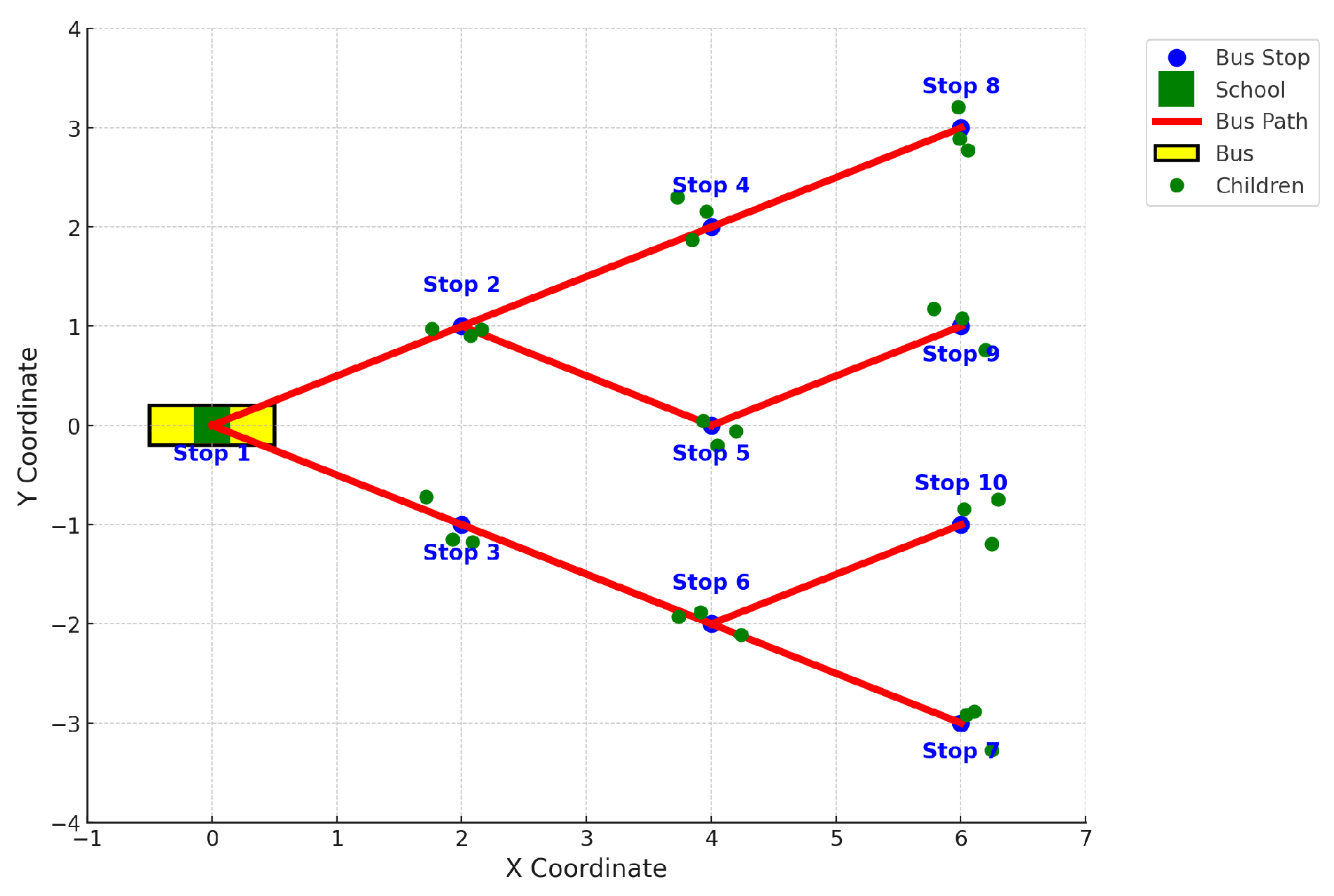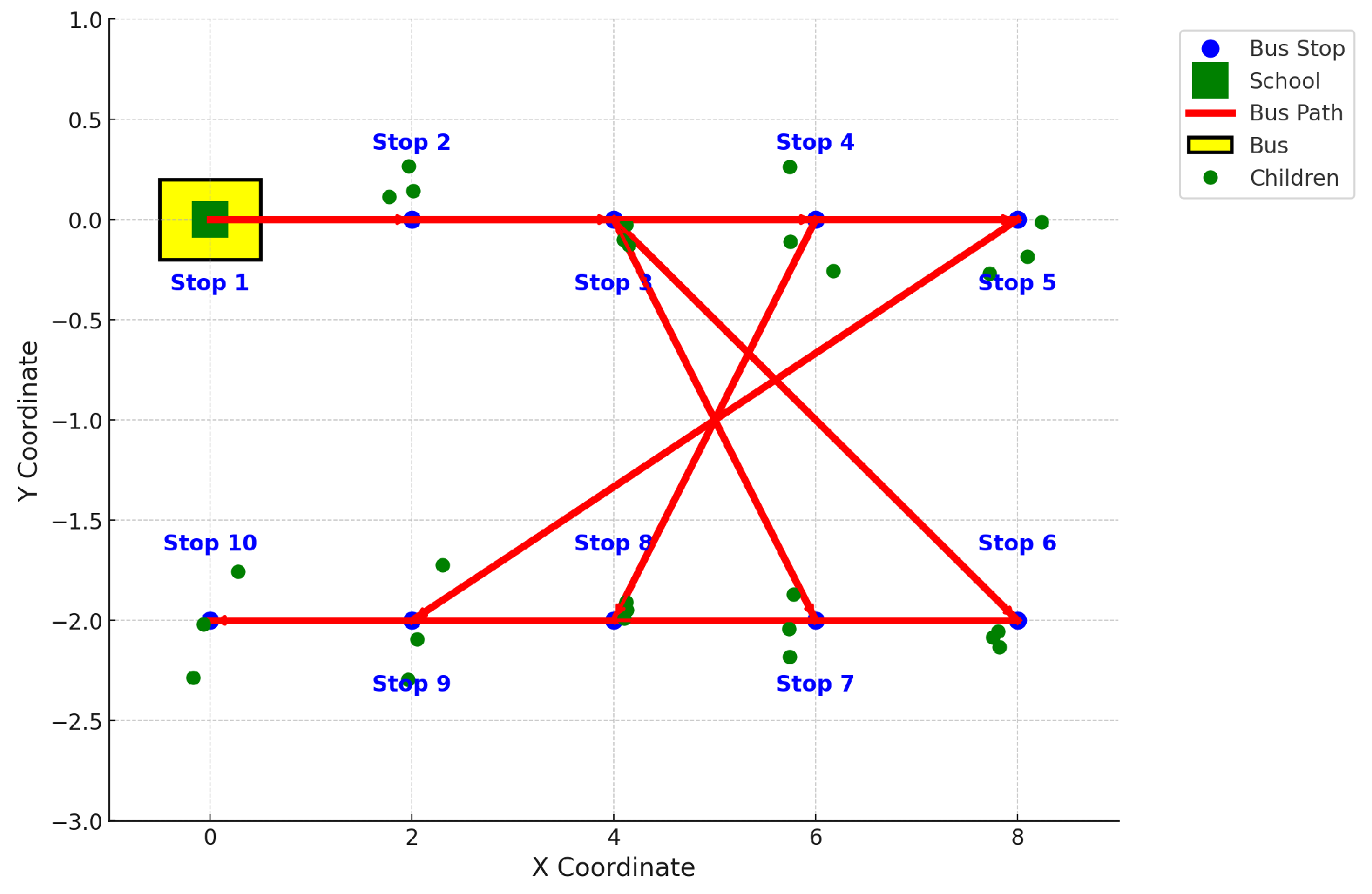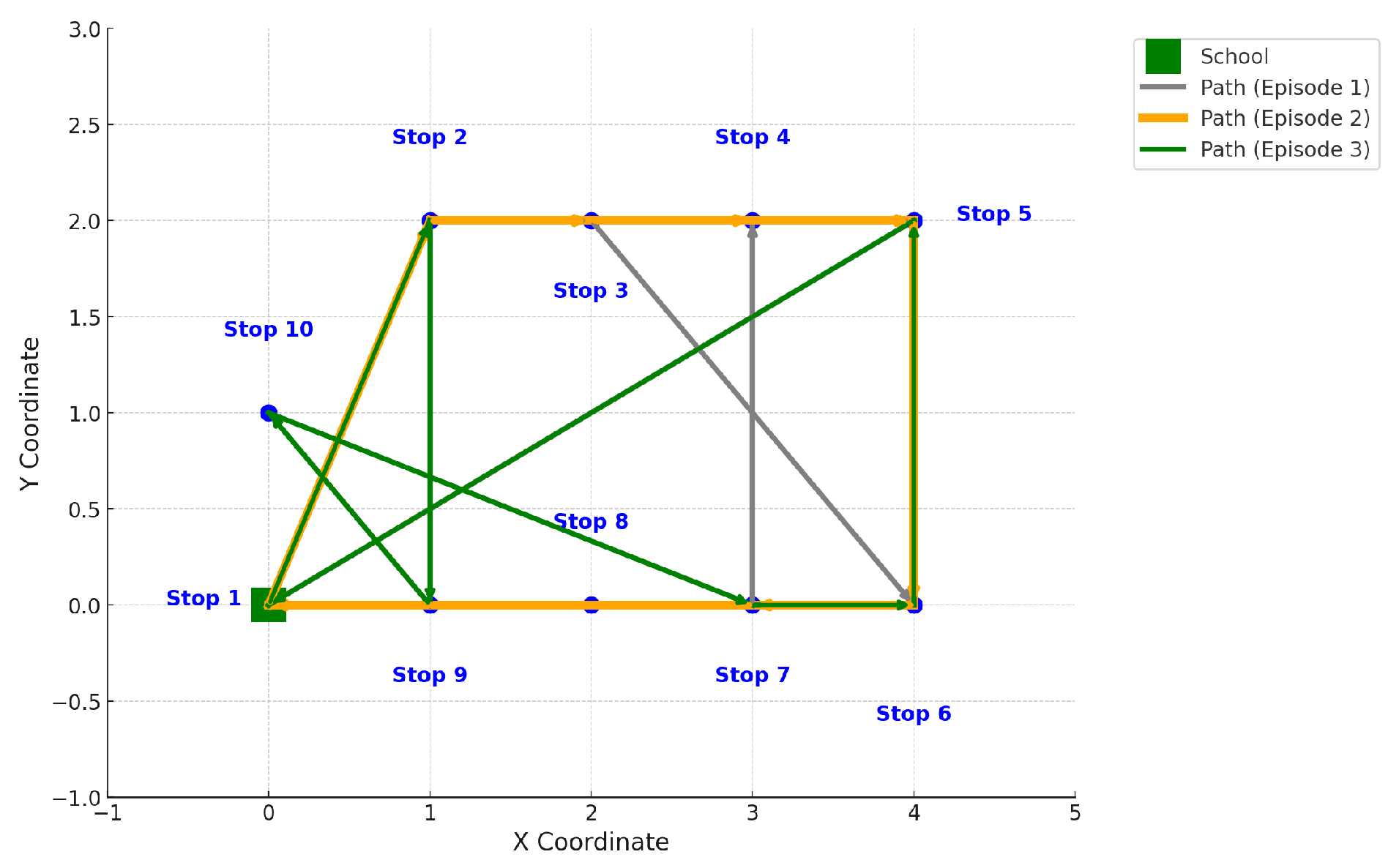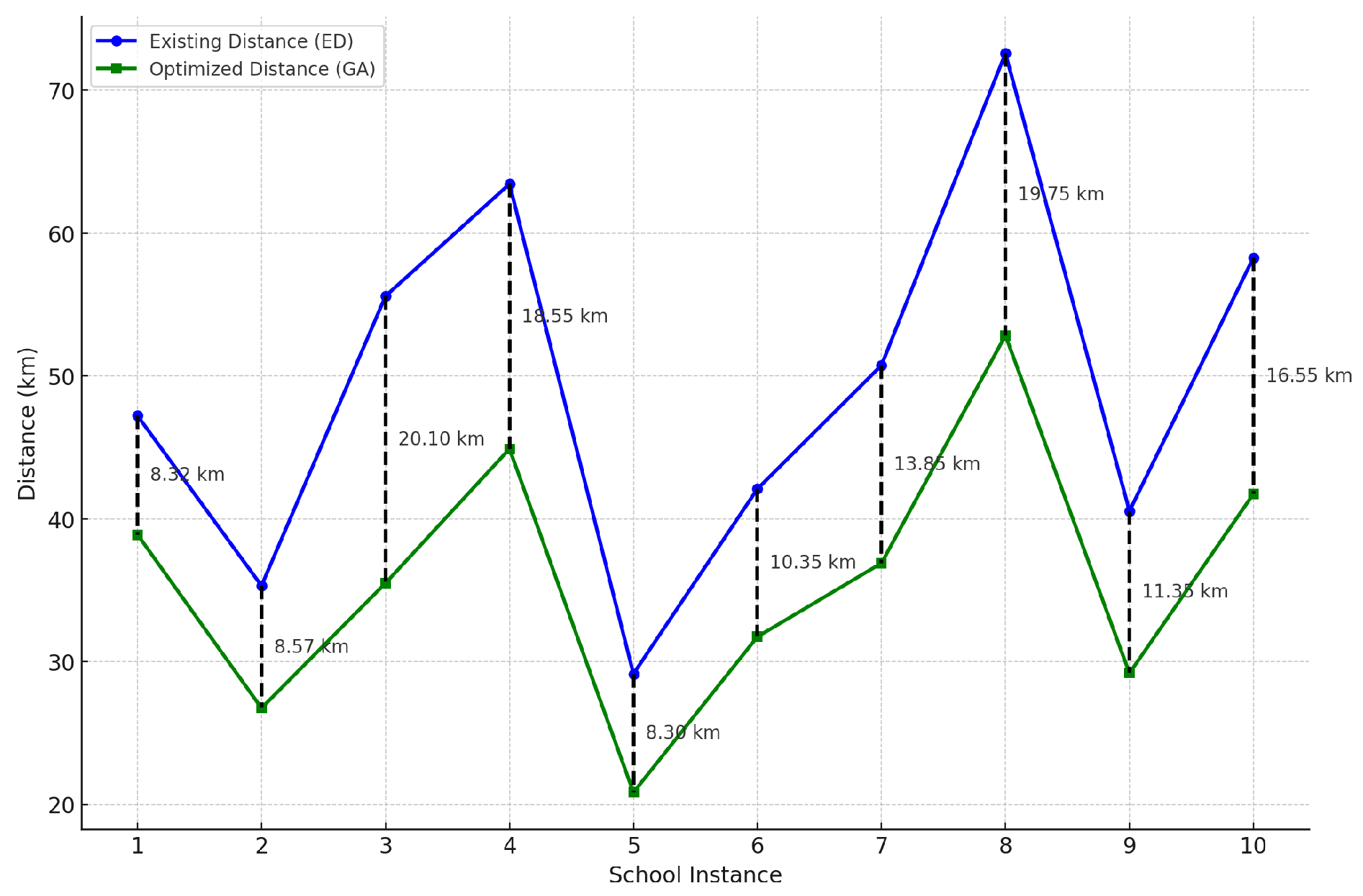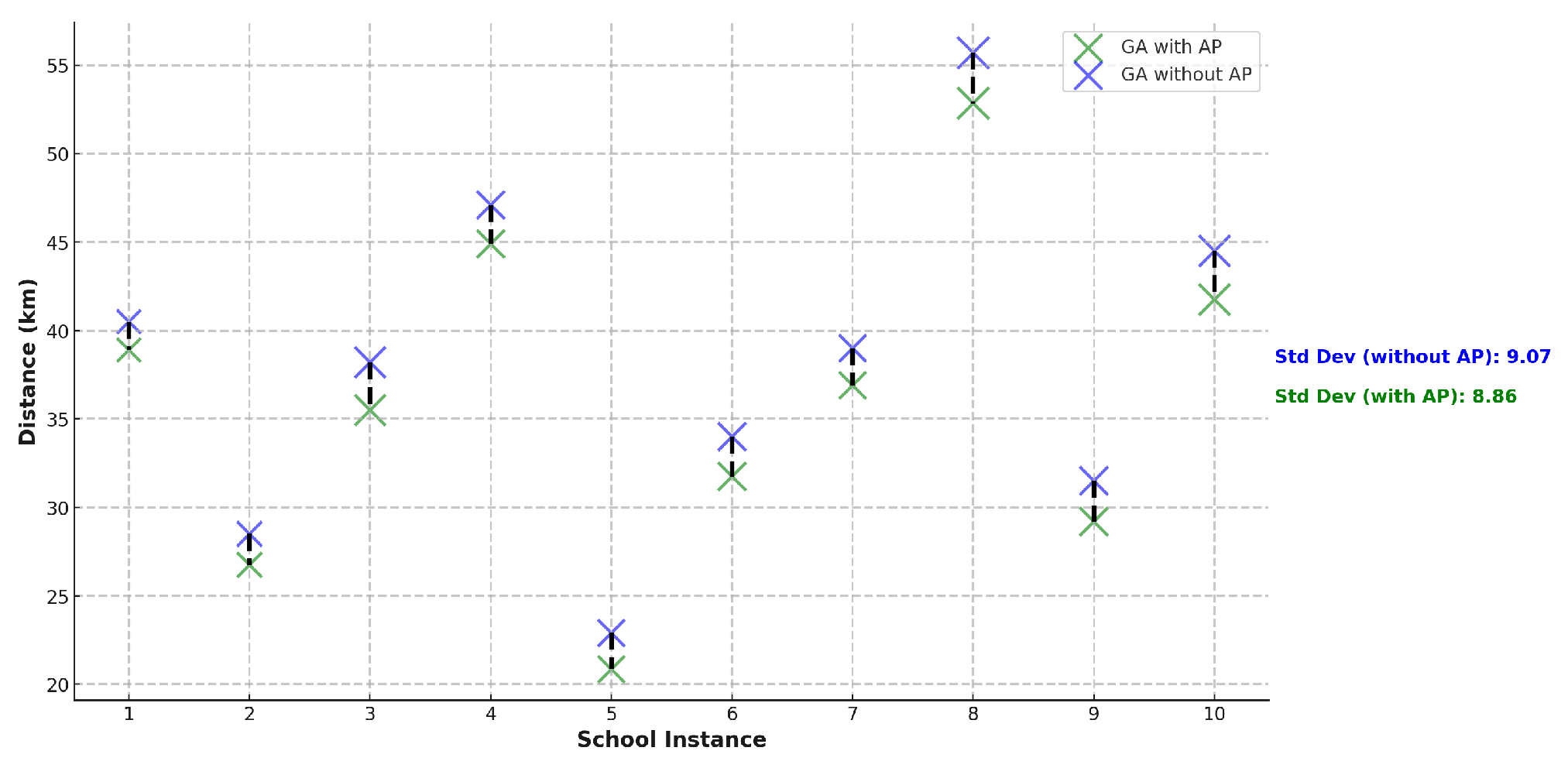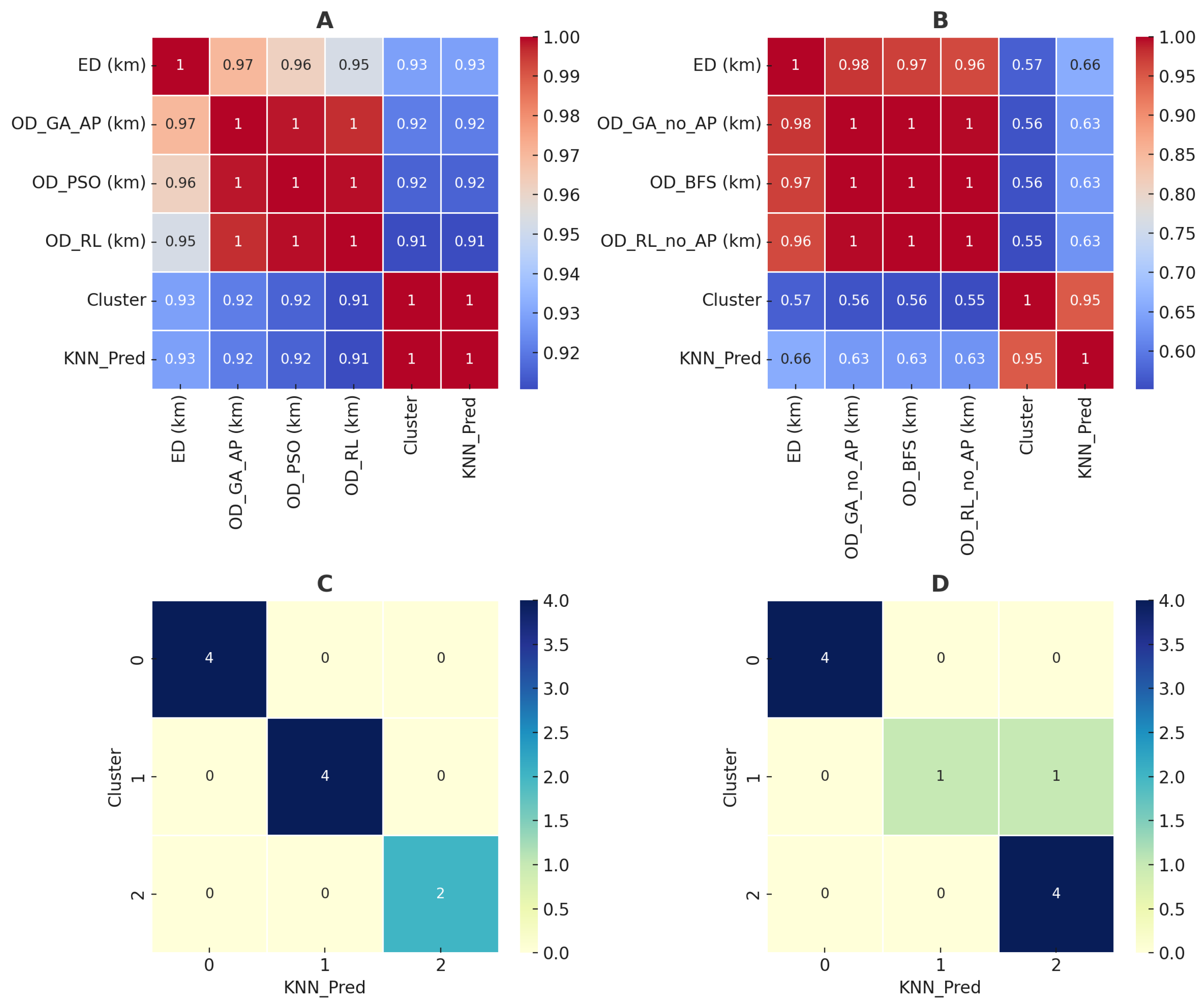4.1. Computation Experiment With Angular Perturbation
In this section, we present the results of the computational experiment conducted with the inclusion of Angular Perturbation (AP) in all of our algorithms. Our objective is to evaluate the effectiveness of AP in optimizing school bus routes in 10 different cases. The performance of the algorithm was compared with and without AP to determine the impact of the perturbation technique on overall distance reduction.
Table 2 compares the performance of three different algorithms—
GAACOSA-AP,
BFSPSO-AP,
RL-AP, and
CPLEX—in optimizing school bus routes for 10 different schools in form of instances. The columns represent several key values for each school: the
Existing Distance (ED) in kilometers (km), the
Optimized Distance (OD) achieved by each algorithm, and the
Objective Function (F = ED - OD), indicating how much each algorithm was able to reduce the original travel distance. The objective is to minimize the total travel distance, and the larger the objective function
F, the better the algorithm has performed.
Looking at the results, the GAACOSA-AP algorithm consistently delivers the best performance across all 10 schools. For example, for School 1, the existing travel distance is 47.22 km, and GAACOSA-AP reduces it to 38.90 km, giving an objective function value of 8.32 km, which is the highest reduction among all algorithms. In contrast, BFSPSO-AP and RL-AP achieve smaller reductions, bringing the distance down to 42.30 km and 43.10 km, respectively, while CPLEX reduces it to 39.95 km. Although all algorithms manage to reduce the travel distance, GAACOSA-AP outperforms the others by achieving the largest reduction.
A similar pattern can be seen for School 3, where GAACOSA-AP reduces the distance from 55.60 km to 35.50 km, a reduction of 20.10 km. This is the largest reduction for this school, while CPLEX comes in second with a reduction of 19.80 km, and the other two algorithms provide slightly smaller reductions. While BFSPSO-AP and RL-AP still manage to significantly reduce the travel distance (by 18.40 km and 19.10 km, respectively), they consistently fall short of the results achieved by GAACOSA-AP.
The consistency of GAACOSAAP is notable across all schools. For example, in School 8, where the existing distance is 72.60 km, GAACOSA-AP reduces the distance by 19.75 km, again outperforming the other methods. This trend is maintained in all 10 schools, with GAACOSA-AP delivering the highest reductions in each case, demonstrating the algorithm’s superiority in optimizing school bus routes.
Although other algorithms, including BFSPSO-AP, RL-AP, and CPLEX, also perform well, their results are consistently less optimal when compared to GAACOSA-AP. For instance, in School 5, the existing distance of 29.15 km is reduced to 20.85 km by GAACOSA-AP, while BFSPSO-AP and RL-AP only reduce it to 22.60 km and 23.10 km, respectively. This consistent pattern of higher objective function values for GAACOSA-AP makes it clear that this algorithm provides the best overall performance for minimizing distances.
In summary, As presented in
Table 3 we select the best and the second best performing algorithm from
Table 2. The results show that
GAACOSA-AP is the most effective algorithm for reducing school bus travel distances. Its consistent superiority in achieving the largest reductions across all schools highlights its robustness and efficiency in solving the School Bus Routing Problem. This suggests that
GAACOSA-AP is a particularly suitable choice for applications where minimizing travel distances is a priority, offering both greater cost efficiency and better route planning.
Figure 7 includes the difference values (in kilometers) between the Existing Distances (ED) and the Optimized Distances (GA). Each difference is displayed next to the vertical lines connecting the two curves, showing how much distance is reduced for each school instance.
4.2. Computation Experiment Without Angular Perturbation
To evaluate the effectiveness of Angular Perturbation (AP) in the GAACO-SA-AP algorithm, we conducted an ablation computational experiment. In this experiment, the Angular Perturbation (AP) strategy was removed from all proposed algorithms and a comprehensive computational analysis was performed. The experimental framework mirrors the structure outlined in
Section 4.1, allowing for a direct comparison of results to assess the specific contribution of Angular Perturbation to the optimization performance.
As shown in
Table 4, The results show that
GAACOSA shortening it to GA consistently performs the best, achieving the lowest optimized distance in all 10 instances, which is highlighted in bold. For example, in
School 1, the existing distance is 47.22 km, and
GA reduces this to 40.50 km, resulting in a reduction of
6.72 km, outperforming both
CPLEX (6.27 km) and the other algorithms (
PSO: 4.12 km,
RL: 3.42 km).
CPLEX follows closely behind, often providing the second-best results, with the difference between GA and CPLEX being relatively small in many cases. For example, in School 3, GA reduces the distance by 17.40 km, while CPLEX achieves a reduction of 18.50 km, slightly better in this instance. However, in the majority of cases, GA outperforms CPLEX by a narrow margin. In contrast, PSO and RL show consistently lower performance compared to GA and CPLEX. For example, in School 5, GA reduces the distance by 6.25 km, while PSO and RL only achieve reductions of 5.35 km and 4.95 km, respectively.
The performance of the algorithms varies between different schools. In some cases, the difference between GA and CPLEX is minimal, such as in School 9, where GA reduces the distance by 9.05 km and CPLEX by 8.45 km (a difference of 0.60 km). In other cases, such as School 7, the difference is more pronounced, with GA outperforming CPLEX by 1.60 km. The greatest reductions are observed in schools with higher distances, suggesting that more complex routes offer greater opportunities for optimization. For instance, in School 8, where the existing distance is 72.60 km, GA reduces the distance by 16.90 km, while CPLEX reduces it by 15.50 km.
In
Figure 8, The algorithms compared are
GA-AP (green),
CPLEX (purple), and
GA without AP (orange).
The X-axis represents the school instances, while the Y-axis corresponds to the vertical offsets for each algorithm (0 for GA-AP, 1 for CPLEX, and 2 for GA without AP). The Z-axis displays the difference in distance between the original and optimized routes (in kilometers).
From the plot, we can see that GA-AP consistently shows smaller differences in distances compared to GA without AP, indicating that the inclusion of Angular Perturbation improves route optimization. CPLEX performs similarly to GA-AP but generally falls between the two variants GA. This comparison highlights the advantages of using angular perturbation in reducing route distances more effectively.
For easy illustration, we select the first and second best perfroming algorthim from
Table 4 and present their results highlighting the performance of the
GA-ACO-SA algorithm versus
CPLEX as show in
Table 5. In all cases, the
GA algorithm consistently outperforms
CPLEX with smaller optimized distances, but the differences between the two algorithms are relatively small, ranging from
0.45 km to
1.40 km. The largest difference is seen in
School 8, where
GA achieves a distance of
55.70 km, compared to
57.10 km for
CPLEX, a difference of
1.40 km. In most other schools, the differences are marginal, with the smallest difference of
0.45 km in
School 1. These results suggest that while
GA-ACO-SA performs slightly better in optimizing routes,
CPLEX remains highly competitive in most cases, with only minimal performance gaps between the two algorithms.
The markers in the graph
Figure 8, illustrate the optimized distances for each school instance, with
green markers representing the distances optimized using AP and
blue markers representing the distances without AP. The size of the markers corresponds to the magnitude of the difference between the two approaches, with larger markers indicating a more significant disparity in performance. Additionally,
dashed black lines connect the optimized distances for each school instance, visually depicting the difference between the two methods. Longer lines signify a greater benefit derived from using Angular Perturbation, as these instances show a more substantial reduction in travel distance.
The graph also includes standard deviation annotations, with the
green text showing the standard deviation for the AP-optimized distances and the
blue text for those without AP. The lower standard deviation in the AP approach (8.86) compared to the non-AP approach (9.07) highlights the more consistent and reliable outcomes produced by the use of Angular Perturbation. This reinforces the notion that AP not only results in shorter distances but also reduces variability across different school instances, ensuring a more stable and predictable optimization process. As illustrated in
Table 5, we have selected the best and second-best results derived from the experimental findings presented in
Table 4. This approach allows us to present the results in a more transparent and understandable manner for our readers.
In
Table 6 ,this experimental results is derived from
Table 2 and
Table 4 and compares the results of the
GAACOSA-AP algorithm with and without the
AP component, highlighting the specific contribution that
AP makes to the overall optimization process.
The ablation experiment revealed significant improvements in the optimized distances when Angular Perturbation (AP) was included in the algorithm. Across the 10 schools in the study, the version of the algorithm that incorporated AP consistently outperformed the version without AP. The differences between the two variants ranged from 1.60 km to 2.85 km, demonstrating that AP has a substantial impact on the ability of the algorithm to minimize travel distances.
For example, in School 3, the GAACOSA-AP algorithm with AP achieved an optimized distance of 35.50 km, while the version without AP resulted in a distance of 38.20 km. This difference of 2.70 km shows the clear benefit of including AP in the optimization process. Similarly, in School 8, the distance was reduced from 55.70 km without AP to 52.85 km with AP, a difference of 2.85 km.
Consistent improvements in all schools underscore the role that AP plays in the refinement of route geometry. Angular Perturbation adjusts the angles between consecutive bus stops, smoothing the route and reducing sharp turns that could increase the overall distance of travel. This enhancement is particularly important for complex routes with many stops or irregular layouts, where sub-optimal turns could lead to inefficiencies.
The greatest difference was observed in School 8, where AP reduced the distance by 2.85 km compared to the non-AP version. In this case, the complexity of the route probably contributed to the greater impact of AP, as the algorithm was able to significantly smooth the path and avoid inefficient detours. This suggests that AP is especially beneficial for routes with more intricate geometries.
Although AP generally provides significant improvements, the experiment also highlights cases where the gains are more marginal. In School 2, for example, the difference between the optimized distances with and without AP was only 1.75 km. Although still a significant improvement, it demonstrates that in simpler routing scenarios, the impact of AP may be less pronounced. In these cases, the base GA-ACO-SA algorithm without AP is already able to generate a near-optimal solution.
It is also important to consider the computational cost associated with angular perturbation. The addition of AP introduces a geometric component that requires additional computation time, particularly for larger instances with many bus stops. However, the improved optimized distances, as shown in the ablation study, suggest that the increased computational effort is justified by the reductions in travel distance. Although the results indicate that the performance gains provided by AP outweigh any additional time complexity, particularly in instances where distance reductions are substantial.
The average optimized distance reduction with angular perturbation is approximately 27. 12%, while the average optimized distance reduction without angular perturbation is approximately 22. 37%. This shows that the use of Angular Perturbation provides a significant improvement in the optimization process.
